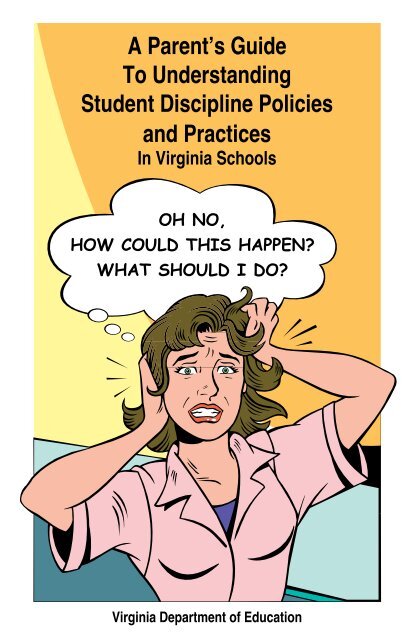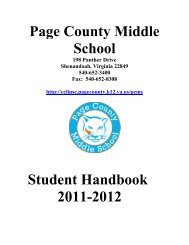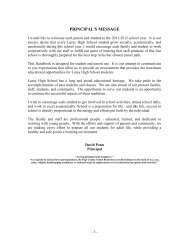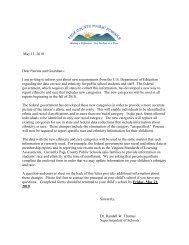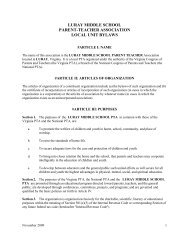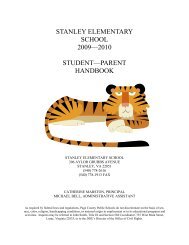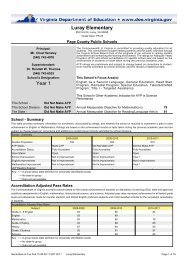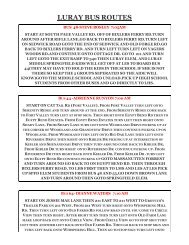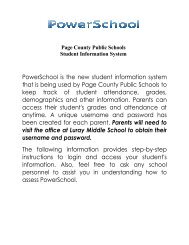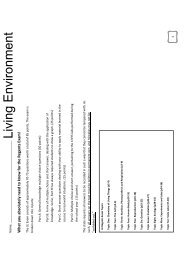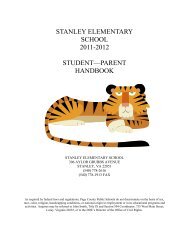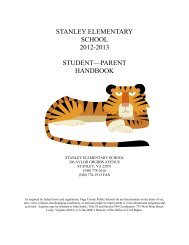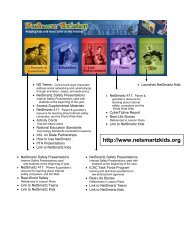Parent Guide to Understanding Student Discipline - Virginia ...
Parent Guide to Understanding Student Discipline - Virginia ...
Parent Guide to Understanding Student Discipline - Virginia ...
You also want an ePaper? Increase the reach of your titles
YUMPU automatically turns print PDFs into web optimized ePapers that Google loves.
A <strong>Parent</strong>’s Gu de<br />
To Understand ng<br />
<strong>Student</strong> D sc pl ne Pol c es<br />
and Pract ces<br />
In V rg n a Schools<br />
OH nO,<br />
HOw cOuld tHis Happen?<br />
wHat sHOuld i dO?<br />
V rg n a Department of Educat on
The <strong>Parent</strong> <strong>Guide</strong> <strong>to</strong> <strong>Understanding</strong> <strong>Student</strong> <strong>Discipline</strong> Policies and Practices in <strong>Virginia</strong><br />
Schools was developed by the Office of <strong>Student</strong> Services, <strong>Virginia</strong> Department of Education.<br />
May 2008.<br />
(c) 2008 by the <strong>Virginia</strong> Department of Education<br />
All rights reserved.<br />
<strong>Parent</strong> Gu de <strong>to</strong> <strong>Student</strong> D sc pl ne Adv sory Group<br />
The authors gratefully acknowledge the assistance of members of the project Advisory Group,<br />
representing educa<strong>to</strong>rs and parents, who generously contributed their time and expertise <strong>to</strong><br />
the development of this <strong>Guide</strong>.<br />
Debra Abadie, <strong>Virginia</strong> PTA<br />
C. Michael Newman, Assistant Executive Direc<strong>to</strong>r for Program Services<br />
<strong>Virginia</strong> Association of Secondary School Principals<br />
Thomas L. Shortt, Executive Direc<strong>to</strong>r<br />
<strong>Virginia</strong> Association of Elementary School Principals<br />
Elizabeth Ewing, Direc<strong>to</strong>r, Legal and Policy Services<br />
<strong>Virginia</strong> School Boards Association<br />
Robert Talley, Administra<strong>to</strong>r for Pupil Placement Services<br />
Chesterfield County Public Schools<br />
Judy Mahler, School <strong>Discipline</strong> Officer (retired)<br />
Newport News Public Schools<br />
<strong>Virginia</strong> Department of Education<br />
Arlene Cundiff, Coordina<strong>to</strong>r, Safe and Drug-Free Schools Program<br />
Authors:<br />
Anne J. Atkinson, Ph.D. and Rebecca V. Gillette, M.A.<br />
PolicyWorks, Ltd., Richmond, VA<br />
Funding for development and printing of this publication was provided by the Safe and Drug-<br />
Free Schools and Communities Act (SDFSCA) CFDA #84.186A
Table of Contents Page<br />
A Letter To <strong>Parent</strong>s . . . . . . . . . . . . . . . . . . . . . . . . . . . . . . . . . . . . . . . . . 1<br />
Ensur ng Safe Learn ng Env ronments . . . . . . . . . . . . . . . . . . . . . . . . . 2<br />
<strong>Student</strong> Respons b l t es And R ghts . . . . . . . . . . . . . . . . . . . . . . . . . . 3<br />
Q.1. What are my child’s responsibilities at school? . . . . . . . . . . . . . . . . . . . . . . . . 3<br />
Q.2. How does my child know what behavior is expected? . . . . . . . . . . . . . . . . . . 3<br />
Q.3. What are the rights and responsibilities of parents? . . . . . . . . . . . . . . . . . . . . 4<br />
Q.4. Under what circumstances can a teacher remove my child from class? . . . . 4<br />
Q.5. Can my child be spanked? . . . . . . . . . . . . . . . . . . . . . . . . . . . . . . . . . . . . . . . 5<br />
Q.6. What is the difference between suspension and expulsion? . . . . . . . . . . . . . 5<br />
Q.7. Who has authority <strong>to</strong> suspend my child from school? . . . . . . . . . . . . . . . . . . . 6<br />
Q.8. What are policies on self defense? . . . . . . . . . . . . . . . . . . . . . . . . . . . . . . . . . 6<br />
Q.9. What happens if my child misbehaves at school? . . . . . . . . . . . . . . . . . . . . . 7<br />
Q.10. What are my child’s rights if he or she is accused of<br />
breaking a school rule? . . . . . . . . . . . . . . . . . . . . . . . . . . . . . . . . . . . . . . . . . 8<br />
Q.11. Will my child be able <strong>to</strong> keep up with his or her class assignments while<br />
he or she is suspended from school? . . . . . . . . . . . . . . . . . . . . . . . . . . . . . . 8<br />
Q.12. Will alternative education programs be provided <strong>to</strong> my child if he or she is<br />
expelled?. . . . . . . . . . . . . . . . . . . . . . . . . . . . . . . . . . . . . . . . . . . . . . . . . . . . 8<br />
Q.13. What offenses can result in expulsion? . . . . . . . . . . . . . . . . . . . . . . . . . . . . . 9<br />
Q.14. Why were the police called when my child got in trouble at school? . . . . . . 9<br />
Q.15. My child has a disability and has an IEP. Is he or she subject <strong>to</strong> the s<br />
ame disciplinary procedures as a child without a disability? . . . . . . . . . . . . 10<br />
D sc pl nary Processes and Procedures . . . . . . . . . . . . . . . . . . . . . . . 10<br />
Q.16. My child has been suspended from school. What do I need <strong>to</strong> know? . . . 10<br />
Q.17. If my child gets a short-term suspension, what does that mean? . . . . . . . . 11<br />
Q.18. If my child gets a long-term suspension, what does that mean? . . . . . . . . 11<br />
Q.19. If my child is expelled, what does that mean? . . . . . . . . . . . . . . . . . . . . . . . 12<br />
Q.20. My child was expelled from school. If we move <strong>to</strong> another county will he<br />
or she be able <strong>to</strong> enroll in school there? . . . . . . . . . . . . . . . . . . . . . . . . . . 13
Q.21. What should I know about discipline hearings? . . . . . . . . . . . . . . . . . . . . . 14<br />
Q.22. When will a discipline hearing be scheduled? . . . . . . . . . . . . . . . . . . . . . . . 14<br />
Q.23. What can I expect at the hearing? . . . . . . . . . . . . . . . . . . . . . . . . . . . . . . . . 14<br />
Q.24. What can I do <strong>to</strong> prepare for a discipline hearing? . . . . . . . . . . . . . . . . . . . 15<br />
Q.25. How can I appeal the school board’s final decision? . . . . . . . . . . . . . . . . . . 15<br />
Q.26. How can I ensure that my child follows school rules as stated in the <strong>Student</strong><br />
Code of Conduct? . . . . . . . . . . . . . . . . . . . . . . . . . . . . . . . . . . . . . . . . . . . . . . . . . 15<br />
Recommendat ons For <strong>Parent</strong>s . . . . . . . . . . . . . . . . . . . . . . . . . . . . . . 16<br />
Preventing problems. . . . . . . . . . . . . . . . . . . . . . . . . . . . . . . . . . . . . . . . . . . . . . . 16<br />
If problems arise . . . . . . . . . . . . . . . . . . . . . . . . . . . . . . . . . . . . . . . . . . . . . . . . . . 16<br />
If your child is suspended. . . . . . . . . . . . . . . . . . . . . . . . . . . . . . . . . . . . . . . . . . . 17<br />
Preparing for a discipline hearing. . . . . . . . . . . . . . . . . . . . . . . . . . . . . . . . . . . . . 17<br />
Sample D sc pl ne Pol c es . . . . . . . . . . . . . . . . . . . . . . . . . . . . . . . . . . 18<br />
Add t onal Informat onal Resources . . . . . . . . . . . . . . . . . . . . . . . . . . 20<br />
v
A Letter To <strong>Parent</strong>s<br />
Dear <strong>Parent</strong>s,<br />
The <strong>Virginia</strong> Department of Education has prepared this <strong>Guide</strong> <strong>to</strong> assist you in understanding<br />
student discipline policies and practices in <strong>Virginia</strong>’s public schools. While the <strong>Guide</strong> will<br />
be informative <strong>to</strong> all parents, it is primarily intended <strong>to</strong> answer questions frequently asked<br />
by parents whose children have violated student conduct policies and have experienced<br />
disciplinary consequences. Topics addressed include the following:<br />
n How <strong>Virginia</strong> law establishes the framework for student conduct policies and<br />
procedures<br />
n The authority of local school boards in establishing local policies and procedures<br />
n Responsibilities of school administra<strong>to</strong>rs <strong>to</strong> ensure safe and secure learning<br />
environments<br />
n Rights and responsibilities of students and of parents<br />
n The disciplinary process related <strong>to</strong> suspension and expulsion from school<br />
The <strong>Guide</strong> includes basic information on <strong>Virginia</strong> laws and a series of questions frequently<br />
asked by parents. Questions are in bold print. Answers are intended <strong>to</strong> be brief,<br />
understandable, and jargon-free. Many of the answers include a reference <strong>to</strong> the Code of<br />
<strong>Virginia</strong> or other resources where you may go for more detailed information. At the end of the<br />
<strong>Guide</strong> is a list of additional information resources.<br />
We hope that this <strong>Guide</strong> will encourage you <strong>to</strong> do the following:<br />
n Support your school’s efforts <strong>to</strong> provide a safe, orderly environment conducive <strong>to</strong><br />
learning for your child and all students.<br />
n Read carefully the school division’s <strong>Student</strong> Code of Conduct. If something is<br />
unclear or concerns you, talk with your child’s principal.<br />
n Review the <strong>Student</strong> Code of Conduct with your child <strong>to</strong> ensure that he or she<br />
understands the rules and possible consequences for breaking them.<br />
n If your child breaks a rule and is disciplined, talk with your child <strong>to</strong> learn his or<br />
her version of what occurred. Meet with the teacher and school administra<strong>to</strong>r<br />
immediately <strong>to</strong> talk about the incident and <strong>to</strong> develop strategies for preventing it<br />
from happening again.<br />
n Understand that <strong>Virginia</strong> law gives the local school board final administrative<br />
authority in all discipline matters.<br />
n Work with your child’s school <strong>to</strong> achieve the goal of responsible behavior.<br />
Remember, the goal of school discipline is not <strong>to</strong> punish, but <strong>to</strong> correct behavior.<br />
n Be an advocate for your child by seeking other types of intervention, if needed.<br />
Disciplinary action alone may not address some problems contributing <strong>to</strong><br />
misconduct.<br />
1
Ensur ng Safe Learn ng Env ronments<br />
V rg n a Laws and Regulat ons<br />
The importance of ensuring that schools are safe and conducive <strong>to</strong> learning is reflected in<br />
numerous laws enacted by the <strong>Virginia</strong> General Assembly and regulations established by the<br />
<strong>Virginia</strong> Board of Education. Among other responsibilities, local school boards are required <strong>to</strong><br />
n Establish policies “designed <strong>to</strong> provide that public education be conducted in an<br />
atmosphere free of disruption and threat <strong>to</strong> persons or property and supportive of<br />
individual rights” (§22.1-253.13:7.D.3, Code of <strong>Virginia</strong>)<br />
n Adopt codes of student conduct and procedures for suspension and expulsion<br />
(§22.1-279.6.B, Code of <strong>Virginia</strong>)<br />
n Develop programs <strong>to</strong> prevent violence and crime on school property and at schoolsponsored<br />
events. (§22.1-279.9, Code of <strong>Virginia</strong>)<br />
Regulations Establishing Standards for Accrediting Public Schools in <strong>Virginia</strong> state that<br />
principals are responsible for effective school management that promotes “a safe and<br />
secure environment in which <strong>to</strong> teach and learn.” Principals must “ensure that the school<br />
division’s student code of conduct is enforced and seek <strong>to</strong> maintain a safe and secure school<br />
environment.” Administra<strong>to</strong>rs must also ensure “a written procedure. . . for responding<br />
<strong>to</strong> violent, disruptive or illegal activities by students on school property or during schoolsponsored<br />
activity.” (Section 8 VAC 20-131-210.A and B and 20-131-260.C.3)<br />
The Role of School Pr nc pals<br />
School administra<strong>to</strong>rs have the responsibility for carrying out policies established by the local<br />
school board. At the school level, principals have primary responsibility for enforcing the<br />
<strong>Student</strong> Code of Conduct. They are typically authorized by local school boards <strong>to</strong> impose<br />
a broad range of disciplinary actions such as in-school suspension, after-school detention,<br />
suspension of certain privileges, and out-of-school suspension for up <strong>to</strong> ten days.<br />
The Role of the Superintendent/Disciplinary Hearing Officer<br />
At the school division level, the superintendent administers discipline policy. In most school<br />
divisions there is a superintendent’s designee who typically conducts disciplinary hearings,<br />
has authority <strong>to</strong> suspend for more than ten days, investigates incidents, and prepares<br />
recommendations for action by the school board. <strong>Virginia</strong> law defines the designee as a “(i)<br />
trained hearing officer or (ii) professional employee within the administrative offices of the<br />
school division who reports directly <strong>to</strong> the division superintendent and who is not a schoolbased<br />
instructional or administrative employee” (§22.1-276.01.B, Code of <strong>Virginia</strong>).<br />
The Role of Local School Boards<br />
In accordance with <strong>Virginia</strong> laws and regulations, only local school boards have the authority<br />
<strong>to</strong> establish student conduct policies and procedures, often referred <strong>to</strong> as “discipline policies.”<br />
Final administrative authority for all disciplinary matters rests with local school boards which<br />
2
determine how and under what circumstances a disciplinary action may be appealed. Only a<br />
local school board has the authority <strong>to</strong> expel a student from school.<br />
The following questions and answers are intended <strong>to</strong> help you better understand school<br />
discipline policy. The questions listed are those most frequently asked by parents when their<br />
children are involved in a disciplinary process.<br />
<strong>Student</strong> Respons b l t es and R ghts<br />
Q .1 . What are my ch ld’s respons b l t es at school?<br />
A.1. At school your child must do the following:<br />
n Attend school and get <strong>to</strong> class on time<br />
n Follow school conduct expectations and rules set forth in the school division’s<br />
<strong>Student</strong> Code of Conduct. (Remember, these apply on the bus <strong>to</strong> and from school<br />
and at school-sponsored activities - even away from school and outside school<br />
hours)<br />
n Follow individual school and classroom rules that are typically in school handbooks<br />
and posted in classrooms<br />
n Show respect <strong>to</strong> other students and school staff.<br />
n Not bring <strong>to</strong> school, use, or possess drugs, alcohol, or <strong>to</strong>bacco products<br />
n Not bring <strong>to</strong> school, use, or possess any weapon or other banned object<br />
n Not participate in any gang or gang-related activity<br />
n Not participate in fights or other forms of violence<br />
Q .2 . How does my ch ld know what behav or s expected?<br />
A.2. At the beginning of each school year, your child will receive a written copy of the<br />
<strong>Student</strong> Code of Conduct that has been approved by the local school board. If you<br />
enroll your child in a school after the beginning of a school year you and your child<br />
will receive the <strong>Student</strong> Code of Conduct as part of the enrollment process. School<br />
rules are typically listed in school handbooks, and classroom rules are typically<br />
posted in classrooms and reviewed by teachers on the first day of school.<br />
Schools carefully review the rules and consequences with students as part of student<br />
orientations, in assemblies, and/or in classrooms. Some schools even have<br />
quizzes <strong>to</strong> test student understanding of the rules. In communities with many non-<br />
English-speaking families, codes and related discipline materials may be available<br />
in several languages.<br />
3
Q .3 . What are the r ghts and respons b l t es of parents?<br />
A.3. <strong>Virginia</strong> law states that parents have responsibilities <strong>to</strong> “assist the school in<br />
enforcing the standards of student conduct and compulsory school attendance”<br />
(§22.1-279.3, Code of <strong>Virginia</strong>).<br />
Within one calendar month of the opening of school, school boards are required <strong>to</strong><br />
send parents of each enrolled student (i) a notice of parental responsibilities, (ii)<br />
a copy of the school board’s standards of student conduct, and (iii) a copy of the<br />
compulsory school attendance law.<br />
<strong>Parent</strong>s are required <strong>to</strong> sign a form acknowledging they received the materials<br />
which include a notice that, by signing the statement of receipt, parents are<br />
not giving up rights protected by the constitutions or laws of the United States<br />
or the Commonwealth. The notice also informs parents of the right <strong>to</strong> express<br />
disagreement with a school’s or school division’s policies or decisions.<br />
A local school board’s policy will include the conditions for requiring parent involvement<br />
and steps for taking action against parents in juvenile and domestic relations court<br />
for willful and unreasonable refusal <strong>to</strong> participate in efforts <strong>to</strong> improve the student’s<br />
behavior or school attendance.<br />
A parent is required <strong>to</strong> provide <strong>to</strong> the school information concerning criminal convictions<br />
or delinquency adjudications for serious crimes listed in §16.1-260, Code of <strong>Virginia</strong><br />
such as firearms offenses, assaults, drug-related offenses, burglary, robbery, or<br />
gang activity (§22.1-3.2.A and B, Code of <strong>Virginia</strong>).<br />
Recommendat ons for <strong>Parent</strong>s<br />
n Review the <strong>Student</strong> Code of Conduct and school handbook with your child <strong>to</strong><br />
ensure that he/she understands the rules and consequences for breaking them. If<br />
something is unclear or concerns you, talk with your child’s principal.<br />
n Read carefully the school division’s notices <strong>to</strong> you about your rights and<br />
responsibilities as a parent. If something is unclear or concerns you, be sure <strong>to</strong> talk<br />
with your child’s principal.<br />
n If your child has been found guilty or “not innocent” of breaking a law, you must<br />
inform the school. If your child has a his<strong>to</strong>ry of problem conduct (or poor academic<br />
performance), work closely with school personnel <strong>to</strong> select classes/programs where<br />
your child has the best opportunity for success.<br />
Q . . Under what c rcumstances can a teacher remove my ch ld from class?<br />
A.4. Teachers have initial authority <strong>to</strong> remove a child from a classroom for disruptive<br />
behavior. Disruptive behavior is defined as “conduct that interrupts or obstructs the<br />
learning environment” (§22.1-276.2, Code of <strong>Virginia</strong>).<br />
The local school board policy will specify each of the following:<br />
n The criteria for removal<br />
n Requirements for reporting removals <strong>to</strong> school administra<strong>to</strong>rs
n Procedures for notifying parents of any incident reported<br />
n <strong>Guide</strong>lines for alternative assignment and instruction of a student who is removed<br />
and the duration of the removal<br />
n Procedures for return <strong>to</strong> class<br />
When a student is removed from class, parents will be offered the opportunity <strong>to</strong> meet<br />
with the teacher and school administra<strong>to</strong>rs.<br />
Recommendat on for <strong>Parent</strong>s<br />
n If your child is removed from class for disruptive behavior, talk with your child<br />
<strong>to</strong> learn about their version of what occurred. Meet with the teacher and school<br />
administra<strong>to</strong>r immediately <strong>to</strong> develop strategies for preventing it from happening<br />
again.<br />
Q . . Can my ch ld be spanked?<br />
A.5. No. <strong>Virginia</strong> law states, “No teacher, principal or other person employed by a school<br />
board or employed in a school operated by the Commonwealth shall subject a<br />
student <strong>to</strong> corporal punishment.” Corporal punishment means inflicting physical<br />
pain on a student as a means of discipline (§22.1-279.1, Code of <strong>Virginia</strong>).<br />
The law against corporal punishment does not prevent:<br />
“(i) the use of incidental, minor or reasonable physical contact or other actions<br />
designed <strong>to</strong> maintain order and control;<br />
(ii) use of reasonable and necessary force <strong>to</strong> quell a disturbance or remove<br />
a student from the scene of a disturbance which threatens physical injury <strong>to</strong><br />
persons or damage <strong>to</strong> property;<br />
(iii) the use of reasonable and necessary force <strong>to</strong> prevent a student from<br />
inflicting physical harm on himself;<br />
(iv) the use of reasonable and necessary force for self-defense or the defense<br />
of others; or<br />
(v) the use of reasonable and necessary force <strong>to</strong> obtain possession<br />
of weapons or other dangerous objects or controlled substances or<br />
paraphernalia which are upon the person of the student or within his control.”<br />
The definition also does not include physical pain, injury or discomfort caused by<br />
participation in practice or competition in an interscholastic sport, or participation in<br />
physical education or an extracurricular activity.<br />
Q .6 . What s the d fference between suspens on and expuls on?<br />
A.6. Short-term suspension, long-term suspension, and expulsion are defined in §22.1-<br />
276.01, Code of <strong>Virginia</strong>.
Short-term suspens on is defined as disciplinary action whereby a student is not<br />
permitted <strong>to</strong> attend school for a period not <strong>to</strong> exceed ten days.<br />
Long-term suspens on is defined as disciplinary action whereby a student is not<br />
permitted <strong>to</strong> attend school for more than ten school days but less than 365 calendar<br />
days..<br />
Expuls on is defined as disciplinary action imposed by a school board whereby a<br />
student is not permitted <strong>to</strong> attend school within the school division and is ineligible<br />
for readmission for 365 calendar days after the date of the expulsion. <strong>Student</strong>s<br />
may apply or reapply for readmission in accordance with school board policy. The<br />
schedule for considering applications for readmission is required <strong>to</strong> be established<br />
so that, if the readmission is granted, the student would be allowed <strong>to</strong> return<br />
<strong>to</strong> school within one calendar year from the expulsion (§22.1-276.01, Code of<br />
<strong>Virginia</strong>).<br />
Although the overwhelming majority of suspensions and expulsions result from acts at<br />
school or school-sponsored activities, a student may be suspended or expelled<br />
also for acts off school property when the acts lead <strong>to</strong> a court judgment of<br />
delinquency, a conviction for very serious crimes, or a charge that would be a<br />
felony if committed by an adult. These laws were enacted by the <strong>Virginia</strong> General<br />
Assembly with the intent of protecting students from others who have committed<br />
violence or other serious crimes (§22.1-277, §16.1-305.1, and §16.1-260, Code of<br />
<strong>Virginia</strong>).<br />
Q .7 . Who has author ty <strong>to</strong> suspend my ch ld from school?<br />
A.7. The school principal or assistant principal have the<br />
authority <strong>to</strong> suspend students out-of-school for up <strong>to</strong> ten<br />
days. The superintendent or designee, typically called a<br />
“disciplinary hearing officer” and appointed by the school<br />
board, may suspend a student for more than ten days.<br />
Only a school board has the authority <strong>to</strong> expel a student.<br />
<strong>Virginia</strong> law permits schools <strong>to</strong> suspend and expel students<br />
for “sufficient cause,” defined by school board policy<br />
(§22.1-277, Code of <strong>Virginia</strong>). The student conduct<br />
policy established by the school board lists the offenses for which a student can be<br />
suspended or expelled.<br />
Additional information on suspension and expulsion is provided in answers <strong>to</strong> Questions<br />
16, 17, and 18.<br />
Q .8 . What are pol c es on self defense?<br />
A.8. The local school board determines policy. The <strong>Student</strong> Code of Conduct may<br />
address self defense as a fac<strong>to</strong>r in determining appropriate disciplinary action, but<br />
is not required <strong>to</strong> address the issue.<br />
The <strong>Virginia</strong> <strong>Student</strong> Conduct Policy <strong>Guide</strong>lines (pp.29-30) advise that if a school board<br />
6
develops policies on self defense, the policies should define when an incident<br />
would be considered an act of self defense. The criteria used in the judicial system<br />
requires that the person claiming self defense must:<br />
n Be without fault in provoking or bringing on the fight or incident;<br />
n Have reasonably feared, under the circumstances as they appeared <strong>to</strong> him or her,<br />
that he or she was in danger of harm; and<br />
n Have used no more force than was reasonably necessary <strong>to</strong> protect himself or<br />
herself from the threatened harm.<br />
Regardless of circumstances, students are never <strong>to</strong> possess weapons of any kind on<br />
school property or school-sponsored activities.<br />
Recommendat ons for <strong>Parent</strong>s<br />
n Be alert <strong>to</strong> any indication that your child may be feeling threatened and find out<br />
what is going on. Help your child <strong>to</strong> develop strategies that will enable him or her <strong>to</strong><br />
avoid getting in trouble.<br />
n Contact your child’s principal <strong>to</strong> seek a resolution <strong>to</strong> any conditions that have made<br />
your child feel the need <strong>to</strong> defend himself or herself.<br />
Q .9 . What happens f my ch ld m sbehaves at school?<br />
A.9. The specific consequences will depend on the student conduct policy. In general,<br />
the more serious the offense, the more serious the consequences. It is important<br />
<strong>to</strong> remember that disciplinary actions in school are intended <strong>to</strong> correct behavior.<br />
Corrective disciplinary action may range from a verbal warning <strong>to</strong> expulsion from<br />
school. School administra<strong>to</strong>rs consider many fac<strong>to</strong>rs in determining consequences,<br />
including the particular circumstances of an incident and whether it is a first or<br />
repeat offense.<br />
Some examples of corrective disciplinary actions available <strong>to</strong> school administra<strong>to</strong>rs are<br />
listed below. These are examples only; some disciplinary actions listed may not be<br />
used by your child’s school and others that are not listed may be used.<br />
n Warning and counseling<br />
n <strong>Parent</strong>/pupil conference<br />
n Changes <strong>to</strong> student classroom assignment or schedule<br />
n <strong>Student</strong> behavior contract<br />
n Referral <strong>to</strong> student support services<br />
n After-school or in-school detention<br />
n Suspension of student privileges for a specified period<br />
n Removal from class<br />
n Initiation of child study process<br />
n Referral <strong>to</strong> in-school intervention, mediation, or community service programs<br />
7
n Short-term suspension<br />
n Long-term suspension (only by superintendent/designee)<br />
n Expulsion (only by school board)<br />
School board policy may impose continued consequences after a student returns <strong>to</strong><br />
school from suspension or expulsion. For example, there may be limitations of<br />
privileges, such as participating in sports, or requirements for community service or<br />
restitution.<br />
Q .10 . What are my ch ld’s r ghts f he or she s accused of break ng a school rule?<br />
A.10. At the heart of the school discipline process are requirements for “due process.”<br />
This means that your child has the right <strong>to</strong> be treated fairly by people who are in<br />
positions of authority, such as school administra<strong>to</strong>rs, teachers, and the police.<br />
Your child must be <strong>to</strong>ld the specific violation he or she is said <strong>to</strong> have committed<br />
and given an opportunity <strong>to</strong> present his or her version of what occurred. If<br />
the school administra<strong>to</strong>r determines your child did, indeed, commit a violation<br />
and imposes disciplinary consequences, additional rights apply. These will be<br />
discussed in Questions 17, 18, and 19.<br />
In all cases, school board policy will determine the rights and methods of appeal.<br />
<strong>Student</strong>s typically do not have a right <strong>to</strong> appeal minor disciplinary consequences<br />
such as after-school detention or in-school suspension.<br />
Your child may be removed immediately from school if he or she is considered <strong>to</strong> be a<br />
danger <strong>to</strong> other students or <strong>to</strong> school property (§22.1-277.04, Code of <strong>Virginia</strong>).<br />
Q .11 . W ll my ch ld be able <strong>to</strong> keep up w th h s or her class ass gnments wh le he or<br />
she s suspended from school?<br />
A.11. A school board may accept academic assignments completed by a student who<br />
has been suspended in accordance with conditions established by the board.<br />
Whether the work is accepted depends on the local school board policy.<br />
Q .12 . W ll alternat ve educat on programs be prov ded <strong>to</strong> my ch ld f he or she s<br />
expelled?<br />
A.12. It depends on local school board policy. School boards are allowed <strong>to</strong> require<br />
students <strong>to</strong> attend alternative education under certain circumstances; however,<br />
alternative education programs are not required <strong>to</strong> be established (§22.1-277.2:1,<br />
Code of <strong>Virginia</strong>).<br />
Some school divisions have provided educational services in a setting or way that is<br />
different from the regular public school, such as through computer-based learning<br />
and online courses. However, local policy determines whether any educational<br />
services are offered <strong>to</strong> a student who has been expelled. Persons 16 years of<br />
age or older who have been expelled from school may participate in the General<br />
Educational Development (GED) testing program (§22.1-254.2.A.6 and 7, Code of<br />
<strong>Virginia</strong>).<br />
8
Q .13 . What offenses can result n expuls on?<br />
A.13. School boards are required by <strong>Virginia</strong> law <strong>to</strong> expel students who commit two<br />
types of offenses:<br />
1. Bringing <strong>to</strong> school firearms or other destructive devices defined in the federal Gun-<br />
Free Schools Act of 1994 (§22.1-277.07, Code of <strong>Virginia</strong>)<br />
2. Bringing drugs, imitation drugs, or marijuana on<strong>to</strong> school property or <strong>to</strong> a schoolsponsored<br />
event (§22.1-277.08, Code of <strong>Virginia</strong>)<br />
Expulsions for other types of offenses are required <strong>to</strong> be based on consideration of the<br />
following:<br />
n The nature and seriousness of the violation<br />
n The degree of danger <strong>to</strong> the school community<br />
n The student’s disciplinary his<strong>to</strong>ry<br />
n The appropriateness and availability of an alternative education placement or<br />
program<br />
n The student’s age and grade level<br />
n The results of any mental health, substance abuse, or special education<br />
assessments<br />
n The student’s attendance and academic records<br />
n Such other matters as deemed <strong>to</strong> be appropriate.<br />
A school board, in accordance with §22.1-277.08 of the Code, may determine, based<br />
on the facts of a particular case, that special circumstances exist and another<br />
disciplinary action is appropriate.<br />
Q .1 . Why were the pol ce called when my ch ld got n trouble at school?<br />
A.14. School officials are required by <strong>Virginia</strong> law (§22.1-279.3:1.<br />
A, Code of <strong>Virginia</strong>) <strong>to</strong> report the following offenses <strong>to</strong> lawenforcement<br />
agencies if these offenses occur on school<br />
property, on a school bus, or at a school-sponsored activity:<br />
n Assault or assault and battery<br />
n Sexual assault, death, shooting, stabbing, cutting, or wounding<br />
of any person<br />
n Stalking of any person<br />
n Any conduct involving alcohol, marijuana, a controlled<br />
substance, imitation controlled substance, or an anabolic<br />
steroid, including theft of prescription medications<br />
n Any threats against school personnel<br />
n Illegal carrying of a firearm on<strong>to</strong> school property<br />
9
n Illegal conduct involving firebombs, explosive materials or devices, hoax explosive<br />
devices, explosive or incendiary devices, or chemical bombs<br />
n Any threats or false threats <strong>to</strong> bomb<br />
n Any incident that would be a felony if committed by an adult.<br />
The offenses listed above are only those required <strong>to</strong> be reported <strong>to</strong> law enforcement<br />
authorities. Many school officials make it a practice <strong>to</strong> report any act that schools<br />
think may be a violation of law. Schools and law enforcement agencies work<br />
closely <strong>to</strong> ensure safe schools; therefore, calling the police or reporting incidents <strong>to</strong><br />
the police is a well-established practice in <strong>Virginia</strong> schools.<br />
A student who commits an act that is a crime is not only subject <strong>to</strong> the school’s<br />
disciplinary process, but also may be charged with a crime and required <strong>to</strong> go<br />
through a criminal process. This is a particularly powerful reason for helping your<br />
child <strong>to</strong> understand and abide by rules in the <strong>Student</strong> Code of Conduct.<br />
Q .1 . My ch ld has a d sab l ty and has an IEP . Is he or she subject <strong>to</strong> the same<br />
d sc pl nary procedures as a ch ld w thout a d sab l ty?<br />
A.15. According <strong>to</strong> §22.1-276.2, Code of <strong>Virginia</strong>, a student with<br />
a disability is entitled <strong>to</strong> the same due process rights that all<br />
students are entitled <strong>to</strong> under the Code and the local school<br />
board’s disciplinary policies and procedures.<br />
Additional rights attach for a student with a disability. Specific<br />
information on procedural safeguards is available on the<br />
<strong>Virginia</strong> Department of Education Web site at www.doe.<br />
virginia.gov/VDOE/sped/proc_safe.pdf<br />
You may also call the Department at (804) 225-2066.<br />
D sc pl nary Processes And Procedures<br />
Q .16 . My ch ld has been suspended from school . What do I need <strong>to</strong> know?<br />
A.16. As the parent of a child suspended from school, it is important <strong>to</strong> understand both<br />
the disciplinary process and the roles and responsibilities of the persons having<br />
authority in the process. Read carefully and keep any written notices you receive;<br />
the notices will contain important information about the process and the names/<br />
titles of persons having authority in the process. Make sure you understand the<br />
following:<br />
n The specific offense for which your child is suspended<br />
n The length of the suspension<br />
n The procedure for having the suspension reviewed or appealed.<br />
If something is not clear, ask for an explanation.<br />
10
The answers given below <strong>to</strong> Questions 17, 18, and 19 will give more details about the<br />
disciplinary process for suspensions and expulsion.<br />
Q .17 . If my ch ld gets a short-term suspens on, what does that mean?<br />
A.17. It means that your child will not be permitted <strong>to</strong> attend school for a period of ten<br />
school days or less. A short-term suspension may be imposed by a principal, an<br />
assistant principal, or a designee teacher in the principal’s absence.<br />
Procedure for Short-term Suspens on<br />
The principal or assistant principal must tell the student of the charges against him<br />
or her. If the student denies them, he or she is given an explanation of the facts as<br />
known <strong>to</strong> the school and an opportunity <strong>to</strong> present his version of what occurred.<br />
Notice <strong>to</strong> the parent may be oral or written, depending on local school board policy,<br />
and must include information on the length of the suspension, the availability of<br />
community-based educational options, and the student’s right <strong>to</strong> return <strong>to</strong> regular<br />
school attendance when the suspension period has expired.<br />
As in all cases of suspension or expulsion, any student whose presence at school<br />
poses a continuing danger <strong>to</strong> persons or property or threat of disruption may be<br />
removed from school immediately (§22.1-277.04, Code of <strong>Virginia</strong>).<br />
Appeal of Short-term Suspens on<br />
A parent may ask for a short-term suspension decision <strong>to</strong> be reviewed by the<br />
superintendent or his designee. Local school board policy will determine whether<br />
the superintendent’s decision is final or can be appealed <strong>to</strong> the school board<br />
(§22.1-277.04, Code of <strong>Virginia</strong>).<br />
Q .18 . If my ch ld gets a long-term suspens on, what does that mean?<br />
A.18. It means that your child will not be permitted <strong>to</strong> attend school for a period of more<br />
than ten school days and less than 365 calendar days. A long-term suspension<br />
is usually imposed by a disciplinary hearing officer upon recommendation of a<br />
principal.<br />
Procedure for Long-term Suspens on<br />
The student must be <strong>to</strong>ld of the charges against him or her. If the student denies<br />
them, he or she is given an explanation of the facts as known <strong>to</strong> the school and an<br />
opportunity <strong>to</strong> present his or her version of what occurred.<br />
Notice <strong>to</strong> the parent (and child) must be in writing and must include information on<br />
the length of and reason for the suspension, the right <strong>to</strong> a hearing in accordance<br />
with local school board policy, the availability of community-based educational<br />
options, and the student’s right <strong>to</strong> return <strong>to</strong> regular school attendance when the<br />
suspension period has expired or <strong>to</strong> attend an appropriate alternative education<br />
program approved by the school board during the suspension or after the<br />
suspension period expires.<br />
11
Costs for any community-based educational programs or alternative programs<br />
that are not part of the program offered by the school division are the financial<br />
responsibility of the parent.<br />
As in all cases of suspension or expulsion, any student whose presence at school<br />
poses a continuing danger <strong>to</strong> persons or property or threat of disruption may be<br />
removed from school immediately (§22.1-277.04, Code of <strong>Virginia</strong>).<br />
Appeal of Long-term Suspens on<br />
A parent has the right <strong>to</strong> appeal a long-term suspension decision in accordance<br />
with local school board policy. The appeal may first go <strong>to</strong> the superintendent or his<br />
or her designee or <strong>to</strong> a sub-committee of the school board; final appeal is <strong>to</strong> the<br />
full school board. The appeal must be decided by the school board within 30 days<br />
(§22.1-277.05, Code of <strong>Virginia</strong>).<br />
Q .19 . If my ch ld s expelled, what does that mean?<br />
A.19. It means that your child will not be permitted <strong>to</strong> attend school for a period of 365<br />
calendar days. Only a local school board has the authority <strong>to</strong> expel a student.<br />
Procedure for Expuls on<br />
The student must be <strong>to</strong>ld of the charges against him or her. If the student denies<br />
them, he or she is given an explanation of the facts as known <strong>to</strong> the school and an<br />
opportunity <strong>to</strong> present his or her version of what occurred.<br />
As in all cases of suspension or expulsion, any student whose presence at school<br />
poses a continuing danger <strong>to</strong> persons or property or threat of disruption may be<br />
removed from school immediately (§22.1-277.04, Code of <strong>Virginia</strong>).<br />
The parent (and child) will be given written notice of the proposed expulsion, the<br />
reasons the expulsion is being proposed, and of the right <strong>to</strong> a hearing before the<br />
school board or a sub-committee of the school board, depending on local policy.<br />
Even if the parent does not exercise the right <strong>to</strong> a hearing, the school board must<br />
act on the recommendation for expulsion.<br />
When the student is expelled, the parent will be sent a written notification of the<br />
length of the expulsion and information on the availability of community-based<br />
educational, training, and intervention programs. The notice will also state whether<br />
or not the student is eligible <strong>to</strong> return <strong>to</strong> regular school or <strong>to</strong> attend an approved<br />
alternative education program or an adult education program offered during or after<br />
the period of expulsion. The notice will also contain information about any terms or<br />
conditions of readmission <strong>to</strong> school.<br />
Costs for any community-based educational programs or alternative programs<br />
that are not part of the program offered by the school division are the financial<br />
responsibility of the parent.<br />
12
Appeal of Expuls on<br />
A parent has the right <strong>to</strong> a hearing before the school board or a sub-committee<br />
of the school board, depending on local policy. The sub-committee of the school<br />
board must have at least three members and if its decision is not unanimous the<br />
parent (or child) may appeal the sub-committee’s decision <strong>to</strong> the full board.<br />
The school board must make a decision within 30 days (§22.1-277.06., Code of<br />
<strong>Virginia</strong>).<br />
The laws of <strong>Virginia</strong> give local school boards final administrative authority for all<br />
disciplinary matters. No further appeal is available.<br />
Pet t on for Readm ss on<br />
The student may apply for readmission <strong>to</strong> be effective one calendar year from<br />
the date of his or her expulsion. <strong>Student</strong>s must meet any terms and conditions<br />
for readmission that were established. Depending on local policy, the application<br />
for readmission may be reviewed and acted on by the superintendent, a subcommittee<br />
of the school board, or the full school board. If the application is denied<br />
by the superintendent or the sub-committee, the student may petition the full school<br />
board for review of the denial (§22.1-277.06., Code of <strong>Virginia</strong>).<br />
Q .20 . My ch ld was expelled from school . If we move <strong>to</strong> another county w ll he or she<br />
be able <strong>to</strong> enroll n school there?<br />
A.20. It depends on local school board policy. A student who has been expelled or<br />
suspended for more than 30 days in one locality may be excluded from attending<br />
school in another locality upon a finding that the student presents a danger <strong>to</strong> other<br />
students or staff. If a student is prevented from entering because of a finding that<br />
the student presents a danger <strong>to</strong> other students or staff, the student and parent<br />
must be given a written notice explaining the reasons for the exclusion and the<br />
right <strong>to</strong> appeal the decision. The local school board establishes the procedures<br />
for review or appeal and determines whether the superintendent, a sub-committee<br />
of the board, or the full school board has the final authority (§22.1-277.2, Code of<br />
<strong>Virginia</strong>).<br />
For a student suspended, the exclusion from the new school cannot exceed the<br />
duration of the suspension from the previous school.<br />
An expelled student may petition for admission at the end of the period of<br />
exclusion. If the petition is rejected, the school board must identify the length of<br />
continuing exclusion and the date on which the student may petition again for<br />
admission.<br />
It is important <strong>to</strong> be aware that <strong>Virginia</strong> law requires that, prior <strong>to</strong> admission of<br />
a student, the parent must swear or affirm as <strong>to</strong> whether the student has been<br />
expelled from a public or private school in <strong>Virginia</strong> or another state (§22.1-3.2,<br />
Code of <strong>Virginia</strong>).<br />
13
Q .21 . What should I know about d sc pl ne hear ngs?<br />
A.21. A discipline hearing is an opportunity for a review of facts known about an alleged<br />
incident. It is an opportunity <strong>to</strong> learn more about the incident and <strong>to</strong> challenge any<br />
claims that you or your child think are not accurate. Even if your child admits the<br />
wrongdoing and no facts are in dispute, the hearing can be used <strong>to</strong> help make sure<br />
that the corrective disciplinary action being imposed is appropriate.<br />
Disciplinary hearings are the only administrative avenue for exercising due process<br />
rights. If you do not take part in hearings, you may give up opportunities <strong>to</strong> be<br />
heard and <strong>to</strong> appeal decisions with which you may disagree.<br />
As noted in the answer <strong>to</strong> Question 16, it is important <strong>to</strong> understand the procedures<br />
for having a suspension or expulsion appealed. These procedures are established<br />
by local school board policy in accordance with requirements in the Code of<br />
<strong>Virginia</strong>; they contain specific requirements and timelines that must be followed.<br />
For example, the policy may require a parent appealing an action <strong>to</strong> file a notice<br />
of appeal in writing and within a specified number of days. If a parent fails <strong>to</strong><br />
file a notice in writing and within the timeframe specified, the right <strong>to</strong> appeal may<br />
be waived. Included as a Supplement <strong>to</strong> this <strong>Guide</strong> is a sample school board<br />
policy with key procedural requirements and timelines highlighted. Be sure<br />
you understand the procedural requirements and timelines in your local school<br />
discipline policies.<br />
Q .22 . When w ll a d sc pl ne hear ng be scheduled?<br />
A.22. Timelines for scheduling discipline hearings are not prescribed in <strong>Virginia</strong> law.<br />
However, school divisions typically make every effort <strong>to</strong> schedule hearings in<br />
a matter of days. The sooner you call <strong>to</strong> inquire, the sooner the hearing can be<br />
scheduled.<br />
Q .23 . What can I expect at the hear ng?<br />
A.23. The hearing may be formal or informal, depending on how the hearing officer<br />
chooses <strong>to</strong> conduct it.<br />
You can expect <strong>to</strong> hear a review of the facts known <strong>to</strong> the school personnel,<br />
the specific violation committed, and possibly the disciplinary action being<br />
recommended by the school administra<strong>to</strong>r. You (and your child) will have the<br />
opportunity <strong>to</strong> respond, <strong>to</strong> challenge any inaccuracies, and <strong>to</strong> present any other<br />
relevant evidence.<br />
The hearing officer may make a decision at the end of the hearing or wait <strong>to</strong> send<br />
the decision <strong>to</strong> you in writing. Even if the decision is given <strong>to</strong> you orally, the hearing<br />
officer must also send you a written decision.<br />
1
Q .2 . What can I do <strong>to</strong> prepare for a d sc pl ne hear ng?<br />
A.24. Some strategies for preparing for a discipline hearing are as follows:<br />
n Review the <strong>Student</strong> Code of Conduct and written policies for disciplinary actions.<br />
n Read carefully all notices and related information that have been sent <strong>to</strong> you. If<br />
anything is unclear, be sure <strong>to</strong> ask for clarification before the hearing.<br />
n Know the specific offense your child is alleged <strong>to</strong> have committed and how the<br />
school defines the offense.<br />
n Do you agree with the facts being presented? Is there another explanation of<br />
what happened? Do you agree with the appropriateness of the recommended<br />
disciplinary action? If not, what do you think are appropriate disciplinary<br />
consequences?<br />
n If you have documents <strong>to</strong> share with the hearing officer, be sure <strong>to</strong> bring copies so<br />
that both you and the hearing officer will have copies.<br />
Q.25. How can I appeal the school board’s final decision?<br />
A.25. There is no further appeal available. <strong>Virginia</strong> law gives local school boards the final<br />
administrative authority for all issues related <strong>to</strong> student discipline issues. Neither<br />
the <strong>Virginia</strong> Board of Education nor the <strong>Virginia</strong> Department of Education has any<br />
legal authority <strong>to</strong> intervene in local discipline matters.<br />
Q .26 . How can I ensure that my ch ld follows school rules as stated n the <strong>Student</strong><br />
Code of Conduct?<br />
A.26. There is probably no way that a parent can “ensure” that a child follows all rules.<br />
However, there are some strategies that will help your child make good decisions<br />
and keep you and your child’s school “on the same page” in guiding good choices.<br />
Please see the recommendations that follow.<br />
1
Recommendat ons For <strong>Parent</strong>s<br />
The answers <strong>to</strong> questions in this <strong>Guide</strong> have contained numerous recommendations for<br />
parents. Here we have compiled them all and added a few more <strong>to</strong> provide a comprehensive<br />
list of recommendations, beginning with strategies for preventing problems from occurring.<br />
Prevent ng problems . . .<br />
n As a parent, you are your child’s first teacher. Build a sound foundation for<br />
responsible behavior by requiring your child <strong>to</strong> follow rules at home and in other<br />
places.<br />
n Find out who your school board member is and support your school’s efforts <strong>to</strong><br />
provide a safe, orderly environment conducive <strong>to</strong> learning for your child and all<br />
students. Stay in <strong>to</strong>uch with your child’s teachers and administra<strong>to</strong>rs so that you<br />
are aware of his or her behavior in school.<br />
n Read carefully the school division’s <strong>Student</strong> Code of Conduct. If something is<br />
unclear or concerns you, be sure <strong>to</strong> talk with your child’s principal.<br />
n Review the <strong>Student</strong> Code of Conduct with your child <strong>to</strong> ensure that he/she<br />
understands the rules and consequences for breaking them. It is important <strong>to</strong> talk<br />
with your child about making good decisions.<br />
n Read carefully the school division’s notices <strong>to</strong> you about your rights and<br />
responsibilities as a parent. If something is unclear or concerns you, talk with your<br />
child’s principal.<br />
n If your child has been found guilty or “not innocent” of breaking a law, you must<br />
inform the school. If your child has a his<strong>to</strong>ry of problem conduct (or poor academic<br />
performance), work closely with school personnel <strong>to</strong> select classes/programs where<br />
your child has the best opportunity for success.<br />
If problems ar se . . .<br />
n Be alert <strong>to</strong> any indication that your child may be having difficulties and find out what<br />
is going on. If your child is being bullied or made <strong>to</strong> feel threatened by another<br />
student, help your child <strong>to</strong> develop strategies that will enable him/her <strong>to</strong> avoid<br />
getting in trouble. Report the situation <strong>to</strong> your child’s principal so that it can be<br />
addressed.<br />
n If your child breaks a rule and is disciplined, talk with your child <strong>to</strong> learn his or<br />
her version of what occurred. Meet with the teacher and school administra<strong>to</strong>r<br />
immediately <strong>to</strong> talk about the incident and <strong>to</strong> develop strategies for preventing a<br />
reoccurrence.<br />
n Remember, the goal of school discipline is not <strong>to</strong> punish, but <strong>to</strong> correct behavior.<br />
Work with your child’s school <strong>to</strong> achieve the goal of responsible behavior.<br />
16
n Be an advocate for your child by seeking other types of intervention, if needed.<br />
Disciplinary action alone may not address some problems contributing <strong>to</strong><br />
misconduct.<br />
If your ch ld s suspended . . .<br />
n As the parent of a child suspended from school, it is important <strong>to</strong> understand both<br />
the disciplinary process and the roles and responsibilities of the persons having<br />
authority in the process.<br />
n Review the <strong>Student</strong> Code of Conduct and written policies for disciplinary actions.<br />
n Read carefully and keep any written notices you receive; the notices will contain<br />
important information about the process and the names/titles of persons having<br />
authority in the process.<br />
n Make sure you understand the following:<br />
- The specific offense for which your child is suspended<br />
- The length of the suspension<br />
- The procedure for having the suspension reviewed or appealed<br />
If something is not clear, ask for an explanation.<br />
A discipline hearing is an opportunity for a review of facts known about an incident.<br />
It is an opportunity <strong>to</strong> learn more about the incident and about the school and <strong>to</strong><br />
challenge any claims that you or your child think are not accurate. Even if your<br />
child admits the wrongdoing and no facts are in dispute, the hearing can be used <strong>to</strong><br />
help make sure that the corrective disciplinary action is appropriate.<br />
Some strategies for preparing for a discipline hearing are as follows:<br />
n Read carefully all notices and related information that have been sent <strong>to</strong> you. If<br />
anything is unclear, be sure <strong>to</strong> ask for a clarification before the hearing.<br />
n Know the specific offense your child is accused of committing and how the school<br />
defines the offense.<br />
n Think about where you agree and disagree with the school.<br />
- Do you agree with the facts being presented? Is there another explanation of<br />
what happened?<br />
- Do you agree with the appropriateness of the recommended disciplinary action?<br />
If not, what do you think are appropriate disciplinary consequences?<br />
n If you have documents <strong>to</strong> share with the hearing officer, be sure <strong>to</strong> bring copies so<br />
that both you and the hearing officer will have copies.<br />
F nally . . .<br />
Understand that <strong>Virginia</strong> law gives your local school board final administrative<br />
author ty n all d sc pl ne matters .<br />
17
Sample D sc pl ne Pol c es<br />
It is important for parents who may wish <strong>to</strong> appeal disciplinary actions <strong>to</strong> understand the<br />
rights, requirements, and timelines contained in local policy. The following examples<br />
with important elements highlighted are provided <strong>to</strong> assist parents in identifying rights,<br />
requirements, and timelines that are typically contained in local policy.<br />
Procedure for Appeal ng Out-of-School Suspens on<br />
of Ten Days or Less<br />
A decision <strong>to</strong> suspend a student may be appealed by the student’s parent or legal guardian.<br />
An appeal of a suspension shall not hold the suspension in abeyance. Failure <strong>to</strong> file a written<br />
notice of appeal within the prescribed time will constitute a wa ver of the<br />
r ght <strong>to</strong> appeal. A parent or legal guardian may appeal a suspens on<br />
<strong>to</strong> the pr nc pal of the school, and then <strong>to</strong> the Superintendent’s<br />
designee in the following manner:<br />
1. A parent or legal guardian shall submit a wr tten letter<br />
of appeal <strong>to</strong> the principal of the school within two<br />
adm n strat ve work ng days of notification of the<br />
suspension. The parent or legal guardian should<br />
state specifically the reasons for the appeal<br />
and consider the following before appealing a<br />
suspension: (1) whether the facts warrant the suspension, (2) if the consequences<br />
were appropriate for the behavior, and (3) whether the school and county<br />
procedures were followed. The pr nc pal shall review<br />
the suspension, all the evidence, and render a written<br />
decision as soon as possible but within three working<br />
days.<br />
2. To appeal further, the parent or legal guardian shall<br />
submit wr tten not ce <strong>to</strong> the pr nc pal,<br />
w th n two adm n strat ve work ng<br />
days of the principal’s decision <strong>to</strong> uphold<br />
the suspension, requesting that the<br />
principal forward the letter of appeal<br />
and all documentation <strong>to</strong> the Superintendent’s<br />
designee for review. The Superintendent’s<br />
designee shall rev ew the nformat on, gather<br />
add t onal nformat on or conduct a hearing, if<br />
necessary, and render a written decision. For the<br />
suspensions of ten days or less, the dec s on of<br />
the Superintendent’s designee shall be final.<br />
18<br />
Right <strong>to</strong> appeal waived<br />
if parent/guardian fails<br />
<strong>to</strong> file notice.<br />
The first level of appeal is <strong>to</strong> the<br />
principal; the next level is <strong>to</strong> the<br />
Superintendent’s designee.<br />
<strong>Parent</strong>’s letter of appeal must:<br />
- be in writing;<br />
- be submitted within two days; and<br />
- state specifically the reasons<br />
The principal must:<br />
- review the suspension and<br />
all related evidence, and<br />
- render a written decision as<br />
soon as possible but within<br />
three working days.<br />
<strong>Parent</strong>’s appeal of the principal’s decision must:<br />
- be in writting;<br />
- be submitted <strong>to</strong> principal within two days of<br />
principal’s decision; and<br />
- request that the letter and all documentation be<br />
forwarded <strong>to</strong> the Superintendent’s designee.<br />
The Superintendent’s designee must:<br />
- review the information;<br />
- gather additional information or<br />
conduct a hearing, if necessary;<br />
- render a decision.<br />
For suspensions of 10 days or less,<br />
the decision of the Superintendent’s<br />
designee cannot be appealed.
The following procedure is an example only. It is provided <strong>to</strong> assist parents in identifying<br />
rights, requirements, and timelines that are typically contained in local policy.<br />
Procedure for Appeal ng Out-of-School Suspens on<br />
of More than Ten Days<br />
The Super ntendent’s des gnee may suspend a student from<br />
school in excess of ten school days after the student and the<br />
parent or legal guardian have been provided wr tten not ce by<br />
the principal of the proposed action, the reason thereof, and<br />
the right <strong>to</strong> a hearing. A decision <strong>to</strong> suspend a student in excess of ten school days may<br />
be appealed by the student’s parent or legal guardian. An appeal of a suspension will not<br />
hold the suspension <strong>to</strong> be temporarily set aside. A parent or legal guardian may appeal a<br />
suspension in excess of ten days <strong>to</strong> the School Board in the following manner:<br />
1. When a student has been suspended more than ten days by the Superintendent’s<br />
designee, the student and the parent or legal guardian may appeal that decision<br />
<strong>to</strong> the School Board. Such an appeal must be n wr t ng and must be filed within<br />
seven calendar days of the decision <strong>to</strong> suspend in excess<br />
of ten days. The parent or legal guardian should state<br />
specifically the reasons for the appeal and consider the<br />
following before appealing a suspension: (1) whether the<br />
facts warrant the suspension, (2) if the consequences were<br />
appropriate for the behavior, and (3) whether school and<br />
county procedures were followed. Failure <strong>to</strong> file a written<br />
appeal within the specified time will constitute a wa ver of<br />
r ght <strong>to</strong> appeal.<br />
2. The School Board shall, w th n 30 calendar<br />
days of the decision <strong>to</strong> suspend in excess of ten<br />
days, conduct a review of the record and render a<br />
written decision.<br />
19<br />
The Superintendent’s designee<br />
is the person who has authority<br />
<strong>to</strong> suspend a student for more<br />
than 10 dyas. <strong>Parent</strong>s must<br />
first be provided written notice.<br />
<strong>Parent</strong>’s appeal must:<br />
- be in writting;<br />
- be filed within seven<br />
calendar days; and<br />
-state specifically the<br />
reasons for the appeal.<br />
Right <strong>to</strong> appeal waived<br />
if parent/guardian files<br />
<strong>to</strong> file an appeal..<br />
The School Board has 30 dyas <strong>to</strong>:<br />
- conduct a review of the record and<br />
- render a written decision.<br />
Note that this policy example does<br />
not state whethreparent has the right<br />
<strong>to</strong> mweeet with or have a hearing<br />
before the School Board. A parent<br />
may wish <strong>to</strong> inquire about a meeting<br />
or a hearing.<br />
Note that there are no provisions for<br />
appeal of the final decision of the<br />
School Board.
Add t onal Informat onal Resources<br />
Laws, regulations, and guidelines that govern student discipline policies and practices in<br />
<strong>Virginia</strong> are available online at the Web sites listed below.<br />
The Code of V rg n a may be accessed online from the <strong>Virginia</strong> General Assembly,<br />
Legislative Information System at http://leg1 .state .va .us/l s .htm<br />
V rg n a Standards of Qual ty are part of the Code of <strong>Virginia</strong>. See §22.1-253.13:1<br />
through 22.1-253.13.8, Code of <strong>Virginia</strong>.<br />
V rg n a Accred tat on Standards are contained in Regulations Establishing Standards<br />
for Accrediting Public Schools in <strong>Virginia</strong>. The full text can be accessed on the<br />
<strong>Virginia</strong> Department of Education Website at http://www .doe .v rg n a .gov/VDOE/<br />
Accountab l ty/soa .html<br />
The V rg n a Board of Educat on <strong>Student</strong> Conduct Pol cy Gu del nes may be<br />
accessed online from the <strong>Virginia</strong> Department of Education at www .doe .v rg n a .<br />
gov/VDOE/Instruct on/Sped/stu_conduct .pdf<br />
<strong>Student</strong>s w th D sab l t es<br />
Additional information on discipline policies and procedures for students with disabilities<br />
is available from A <strong>Parent</strong>’s <strong>Guide</strong> <strong>to</strong> Special Education at www .doe .v rg n a .<br />
gov/VDOE/sped/proc_safe .pdf<br />
© 2008 Commonwealth of <strong>Virginia</strong> Department of Education<br />
The <strong>Virginia</strong> Department of Education does not discriminate on the basis of race, color,<br />
national origin, sex, age, or disability in employment or provisions of service.<br />
20


